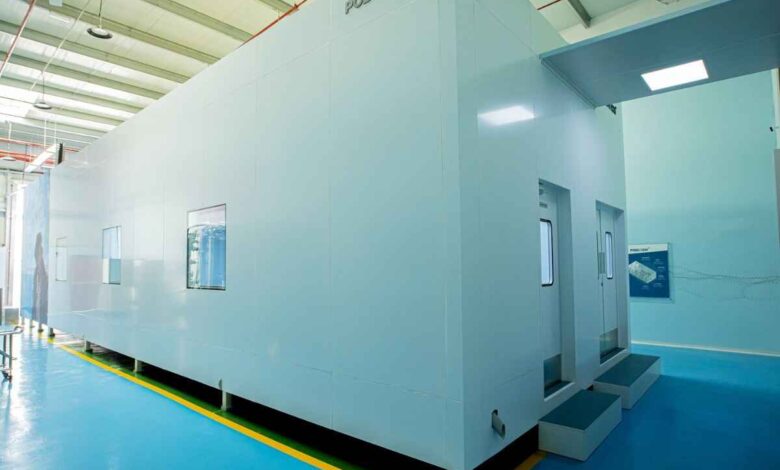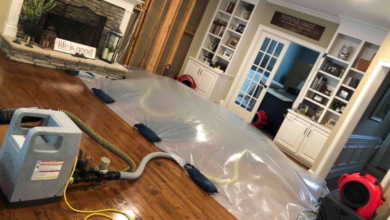The Rise of Portable Modular Cleanrooms: A Revolution in Controlled Environments

In today’s fast-paced industrial landscape, the demand for cleanroom facilities is more critical than ever. Industries ranging from pharmaceuticals to electronics require environments free from contaminants to ensure product integrity and safety. However, the traditional cleanroom setup can be both time-consuming and costly. Enter portable modular cleanrooms—a game-changing solution that combines flexibility, efficiency, and cost-effectiveness.
What Are Portable Modular Cleanrooms?
Portable modular cleanrooms are prefabricated structures designed to create controlled environments that meet specific cleanliness standards. Unlike traditional cleanrooms, which require extensive construction and long lead times, these modular units can be deployed quickly and easily, making them ideal for a variety of applications.
The modular design means that these cleanrooms can be expanded, reconfigured, or relocated as needs change, providing businesses with a scalable solution that adapts to their evolving requirements. This adaptability is particularly advantageous in industries where projects fluctuate, enabling companies to respond swiftly to changing demands.
Key Features and Benefits
Rapid Deployment
One of the most significant advantages of portable modular cleanrooms is their rapid deployment capability. While traditional cleanroom construction can take months, modular units can often be set up in a matter of days. This speed allows businesses to start production or research processes sooner, giving them a competitive edge in the market.
Customization
Portable modular cleanrooms can be tailored to meet specific cleanliness classifications (such as ISO 14644) and other regulatory requirements. Businesses can choose features such as airflow patterns, temperature and humidity controls, and surface materials based on their unique operational needs. This level of customization ensures that companies can maintain optimal conditions for their processes, whether they’re manufacturing pharmaceuticals, semiconductor chips, or sensitive electronics.
Cost-Effectiveness
Setting up a traditional cleanroom often involves significant capital investment, including construction, utilities, and compliance costs. In contrast, portable modular cleanrooms can reduce these expenses substantially. Since they are pre-engineered and often designed for reusability, companies can save on both initial setup and future expansions. Additionally, their modular nature means that if a business no longer needs a cleanroom, they can easily relocate or sell the unit.
Enhanced Flexibility
As business needs evolve, so do the requirements for cleanroom environments. Portable modular cleanrooms offer the flexibility to adapt to changing demands. For example, if a pharmaceutical company needs to scale up production, it can quickly add more cleanroom space without the delays associated with traditional construction. Conversely, if demand decreases, they can easily downsize or relocate the cleanroom to a different facility.
Improved Compliance and Quality Control
Maintaining compliance with stringent industry regulations is vital for businesses operating in clean environments. Portable modular cleanrooms are designed with compliance in mind, and equipped with advanced filtration systems, controlled airflow, and monitoring capabilities to ensure that they meet necessary standards. This focus on quality control not only helps prevent contamination but also supports companies in maintaining their reputation for excellence.
Applications Across Industries
Pharmaceuticals
In the pharmaceutical industry, maintaining sterile conditions is paramount. Portable modular cleanrooms can be deployed for various applications, including drug formulation, packaging, and testing. Their quick setup and adaptability make them ideal for companies needing to respond swiftly to emerging health crises or changes in market demand.
Biotechnology
Biotech companies often require cleanroom environments for cell culture, tissue engineering, and other sensitive processes. The flexibility of modular cleanrooms allows these organizations to create the ideal conditions for their work without the delays associated with permanent installations.
Electronics Manufacturing
As electronic components become smaller and more sensitive, the need for controlled environments in manufacturing processes grows. Modular cleanrooms can support everything from semiconductor fabrication to assembly, providing the cleanliness and environmental controls needed to protect delicate components.
Aerospace
The aerospace industry demands high standards of cleanliness and precision. Portable modular cleanrooms are increasingly used for assembly and testing processes in aerospace manufacturing, where contaminants can compromise the safety and performance of critical components.
Conclusion
The rise of portable modular cleanrooms represents a significant shift in how industries approach controlled environments. With their rapid deployment, customization options, cost-effectiveness, and flexibility, these cleanrooms are becoming an essential part of modern manufacturing and research processes.
As industries continue to evolve, the ability to quickly adapt to new challenges while maintaining high standards of cleanliness will be vital. Portable modular cleanrooms not only meet these needs but also pave the way for innovation and efficiency in a rapidly changing world. Whether you’re in pharmaceuticals, biotechnology, electronics, or aerospace, investing in a portable modular cleanroom could be the key to unlocking new potential for your business.





